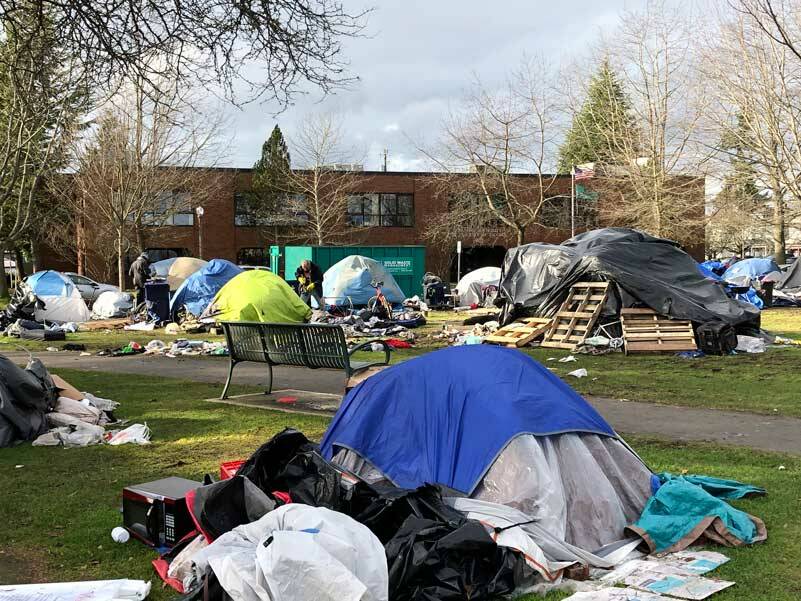By Morf Morford, Tacoma Daily Index
What do homeless people want?
You’d think that question would find itself at the top rankings of the ultimate dumb questions.
And maybe it is.
And that might be why so few people ask it. Or even consider it.
But the answer, whether simple or complicated, leads to the solution to a problem that seems to be the bane of every urban center around the world.
Corporate marketers hold focus groups to explore and analyze every aspect of every age, income and education demographic distribution on just about any conceivable topic or product.
We, as individuals or as family members are accustomed to asking what our children or partners want – for a birthday or even for dinner.
Asking people what they want could not be more basic.
But instead of asking directly, we ask each other, or neighbors, or “concerned citizens” (usually “concerned” about their own neighborhoods or property values), or we hold statistically unreliable “media surveys” on homeless policies or “public camping” rules.
Homeless people want what all people want
You don’t have to be a psychologist or social worker to realize that homeless people want what all people want. They, like every one of us, want autonomy, choice and a little bit of respect.
And affordable shelter would be nice, too.
Do you look forward to being “serviced”?
Yes, they need “services”.
But do they need services that are so very different from the rest of us?
The “services” we have are built-in and are so far under our radar that we don’t even notice them.
How about the luxury of a good night’s sleep?
Or any aspect of personal hygiene?
Or the simple act of leaving something and finding it there when you return?
Or how about having a safe and secure place you can call your own?
Along with those basic practical needs, they also have another category of needs that we all share – the need to feel heard, respected, and understood.
Homelessness probably not on their bucket list
Virtually all, if not every one of the homeless people we see huddled outside their tarps and makeshift shelters once, maybe even for an extended time in their lives, were employed, in relationships and families, many of them home-owners.
Many of them are working (about one in four by most surveys) and many had reasonably stable lives, not so different from most of us until “something” happened.
And that “something” could happen to any of us.
Every homeless person got to that rag-tag shelter by their own circuitous, convoluted and seemingly inevitable route.
Few, if any of them, ever decided as young adults that being homeless was on their career trajectory or on their “bucket list”.
It took most of them many disasters or a few bad decisions to get them where they are.
Most of us have never encountered the disasters or the grim choice of bad – or terrible – decisions most of them have faced.
And if we had, we could easily be there alongside them.
They need productive and positive choices – not their usual bad – or worse – options.
No s’mores at this “camp”
I’ve never liked the term “camp” for homeless clusters.
“Camp” usually brings to mind a voluntary – even enjoyable – gathering around activities and companions all intent on a good time.
A temporary collection of drifters, runaways, strangers and recently evicted, ejected or desperate is no one’s idea of a vacation.
Cost or investment?
There’s a simple rule in business management; give your people what they need to succeed.
What if we gave homeless people what they needed to succeed?
Most of them almost certainly never had that option in front of them.
The average homeless person costs the average municipality about ten to twenty thousand dollars each year.
The typical cost of incarceration in a state or federal prison is about $20,000 per year.
But what if we considered these as up-front investments instead of costs?
What if, instead of an endless flood of expenses draining our budgets, we invested in them and moved them, or allowed them to move themselves, into safer, more contributing aspects of our economy.
I know that is it hard to believe, but under that scruffy, hardened appearance is another person who once had (and maybe still has) dreams of a productive and rewarding life.
And the bottom line is that they need what we have all needed (and some of us have, thanks to the vagaries of the life lottery with some of us winners and some of us losers) – to be equipped with the skills and tools to perform meaningful work, to be respected and recognized for their contributions, and ultimately to make an impact for good in the world.
In a recent survey in Los Angeles, 92% of homeless persons said that their highest priority was appropriate shelter. You can see the details on the survey here.
The ragged tents and tarps, and equally ragged and bedraggled people on too many public streets and parks is the ultimate barometer of the success – or failure – of our values and economic system.
To see our economy fail so many, for so long, is not a good sign. Nobody likes it, and nobody looks good.
We can do better.





